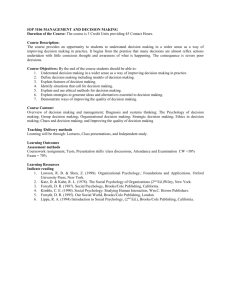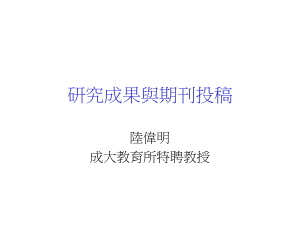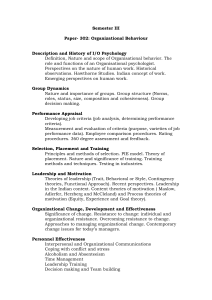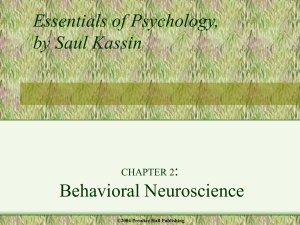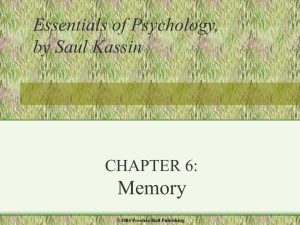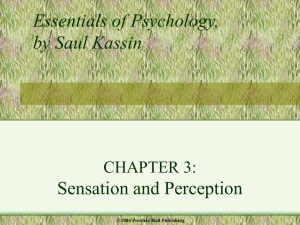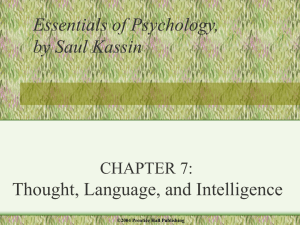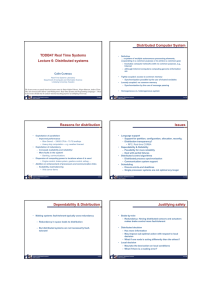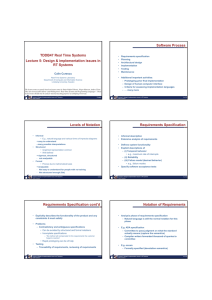ORGANIZATION DEVELOPMENT AND CHANGE during the
advertisement
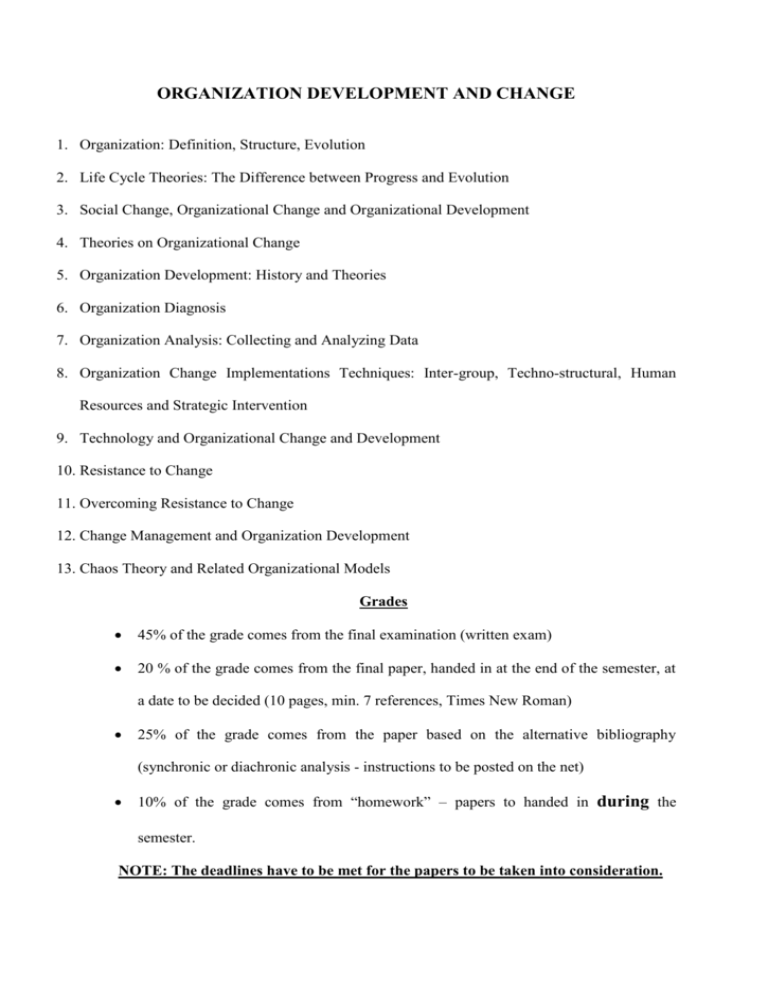
ORGANIZATION DEVELOPMENT AND CHANGE 1. Organization: Definition, Structure, Evolution 2. Life Cycle Theories: The Difference between Progress and Evolution 3. Social Change, Organizational Change and Organizational Development 4. Theories on Organizational Change 5. Organization Development: History and Theories 6. Organization Diagnosis 7. Organization Analysis: Collecting and Analyzing Data 8. Organization Change Implementations Techniques: Inter-group, Techno-structural, Human Resources and Strategic Intervention 9. Technology and Organizational Change and Development 10. Resistance to Change 11. Overcoming Resistance to Change 12. Change Management and Organization Development 13. Chaos Theory and Related Organizational Models Grades 45% of the grade comes from the final examination (written exam) 20 % of the grade comes from the final paper, handed in at the end of the semester, at a date to be decided (10 pages, min. 7 references, Times New Roman) 25% of the grade comes from the paper based on the alternative bibliography (synchronic or diachronic analysis - instructions to be posted on the net) 10% of the grade comes from “homework” – papers to handed in during the semester. NOTE: The deadlines have to be met for the papers to be taken into consideration. ALTERNATIVE BIBLIOGRAPHY 1. Isaac, Asimov – Prelude to Foundation 2. Golding, William – The Lord of the Flies 3. Herbert, Franke – Dune (vol. I-II) 4. Orwell, George – Animal Farm 5. Orwell, George – 1984 6. Jules Verne – Two Years Vacation Exam subject nr. 1. a. Identify and describe the Zenon paradox. b. Explain the limitation of the Zenon paradox and how we can prove it wrong at a theoretical level c. Explain how we can use the Zenon paradox as a useful tool for OD from the perspective of chaos theory. BIBLIOGRAFIE 1. Adler, N.J. International dimensions of organizational behavior, 1986, Boston, MA: Kent. 2. Androniceanu, Armenia – Managementul schimbărilor, 1998, Editura All, Bucureşti. 3. Archer, Margaret S., Being Human: The Problem of Agency, 2000, Cambridge University Press. 4. Bartunek, Jean M. si. Moch, Michael K - First Order, Second Order and Third Order Change and OD Interventions: A cognitive Approach, in The Journal of Applied Behavioural Science, vol. 22, nr. 4, p. 483-500. 5. Bernoux, Philippe - La sociologie des organisations, 1989, Ed. Du Point, Paris. 6. Berry J.W., Poortinga Z.H., Segall, M.H., Dasen P.R, Cross-Cultural psychology Reasearch and applications, 1992, Cambridge University Press. 7. Black, J. Stewart, Gregersen, B. Hal - Leading Strategic Change, 2002, Financial Times Prentice Hall. 8. Bryman, Alan – Research Methods and Organization Studies, 1999, Unwyin Hyman, London. 9. Burduş, Eugen; Căprărescu Gheorghiţa; Androniceanu, Armenia şi Miles, Michael – Managementul schimbării organizaţionale, 2000, Editura Economică, Bucureşti. 10. Burke, Warner – Organization Development, Ediţia a doua, 1994, Addison- Wesley Publishing Company. 11. Cameron, S. Kim, Ouinn, E. Robert - Diagnosing and Changing Organizational Culture: Based on the Competing Values, 1999, Addison-Wesley Publishing Company. 12. Carnall, A.Colin - Managing Change in Organizations, 1994, Prentice Hall International Ltd., UK. 13. Carr, David; Hard, Kelvin şi Trahant J. William – Managing the Change Process, 1996, McGraw-Hill, New York. 14. Coch, L. si French, J.R.P., jr. - Overcoming Resistance to change în Human Relations, 1948, nr. 2, p. 512 - 532. 15. Cummings, G. Thomas; Worley, G. Christopher - Essentials of Organization Development and Change, 2000, South-Western Publishers. 16. Dale, Reidar - Organisations and Development, 2000, SAGE Publications. 17. Dalton, Gene, Lawrence, R. Paul şi Greiner E. Larry - Organizational Change and Development, 1970, Irwin Inc. & The Dorsey Press, USA. 18. Dawson, Patrick – Organizational Change: A Procesual Approach, 1994, Paul Chapman Publishing Ltd, New York. 19. Deal, T.E., Kennedy, A.A- Corporate Cultures: The rites and rituals of corporate life în: I.L. Pierce, J.W. Newstorm (Eds.) The manager’s bookshelf. A mosaic of contemporary views. (Second edition), 1990[1982], New York, Harper&Row. 20. Dodu, Marius, Ghioltan Calin, Hintea, Calin, Tripon, Ciprian – Administraţie Publică, 2000, Ed. Accent, Cluj Napoca. 21. DuBrin, Andrew - Fundamentals of Organizational Behaviour: An Applied Perspective, 1974, New York: Pergamon Press. 22. Etzioni, Amitai- The Active Society, 1968, New Free Press, New York. 23. Flamhotz, Eric şi Randle, Yvonne – Changing the Game (Organizational Transformations of the First, Second and Third Kinds), 1998, Oxford University Press, Oxford. 24. French, Wendell şi Bell H. Cecil, jr – Organization Development (Behavioral Science Interventions for Organization Improvement), 1999, Prentice Hall, New Jersey. 25. Friendlander, Frank şi Brown, L. Dave – Organizational Development în Annual Review of Psychology, vol. 25, 1974, Davies-Black Publishing. 26. Glassman, M. Alan; Cummings, G. Thomas – Cases in Organizational Development, 1991, Irwin, Boston. 27. Golembiewski, T. Robert – Approaches to Planned Change (Orienting Perspectives and Micro-Level Interventions), 1993, Transaction Publishers, New Brunswick. 28. Golembiewski, T. Robert – Managing Diversity in Organizations, 1995, The University of Alabama Press, Tuscaloosa şi London. 29. Golembiewski, T. Robert- High Performance and Human Costs: A Public Sector Model of Organizational Development, 1998, Praeger, New York. 30. Hales, Colin - Managing through Organizations , 2000, SAGE Publications. 31. Harvey, Donald; Brown, R. Donald - An Experiential Approach to Organization Development, 2000 Prentice Hall. 32. Heller, F.- Some theoretical and practical problems in multinational and crosscultures research on organizations în: P. Joynt, M. Warner (Eds.), Managing in diferent countries, 1985, Oslo Universitetsforlaget. 33. Heller, F.A., Wilpert, B.- Competence and power managerial decisions-making, (1981), Chichester: Wiley. 34. Hofstede, G.- Dimensions of national cultures in fifty countries and three regions în: J.B. Deregowski, S. Dziurawiec, R.C. Annis (Eds), Explanations in crosscultural psychology, 1983, Lisse Swets&Zeitlinger. 35. Hofstede, G., Neuijen, B., Ohayv, D.D., Sanders, G.- Measuring organizational cultures: A qualitative/quanitative study across twenty cases, Administrative Sciences Quarterly, 1990, nr. 35, p. 286-316. 36. Huczynski, Andrej – Encyclopedia of Organizational Change Methods, 1987, Gower Publishing Company Limited, Aldershot, England. 37. Huse, F. Edgar şi Cummings, G. Thomas - Organization Development and Change, a treia editie, 1985, West Publishing Company, Minnesota. 38. Jackson, J. Paul - Virtual Working: Social and Organizational Dynamics, 1999, Rutledge Publications. 39. Kanter, Rosabeth Moss - The Change Masters, 1996, International Thomson Business Press. 40. Kanter, Rosabeth Moss, Stein, A. Barry şi Todd D. Jick - The Challenge of Organizational Change (How Companies Experience It and Leaders Guide It), 1992, The Free Press, New York, USA. 41. Kiefer, Charles şi Senge, M. Peter – Metanoic Organizations in Transforming Work, p. 69-84, editata de John D. Adams, 1984, Miles River Press. 42. King, Nigel si Anderson, Neil - Innovation and Change in Organisations, 1995, Routledge, London. 43. Kotter, John si Cohen, S. Dan - The Heart of Change: Real Life Stories of how People Change Their Organizations, 2002, Harvard Business School. 44. Laurent, A.- The cultural diversity of Western conceptions of management, 1983, International Studies of Man and Organizations, nr. 13, 75-96. 45. Lawrence, Paul - How to Deal with Resistance to Change, Harvard Business Review, 1969, Ianuarie- Februarie, p. 115-122. 46. Leigh, Andrew - Effective Change, 1997, Institute of Personnel Management, London. 47. Lewin, Kurt - Field Theory in Social Change, 1951, Harper & Row, New York. 48. Lippit, Watson şi Westley – Dynamics of Planned Change, 1958, New York: Harcourt and Brace. 49. Lowry, P. Ritchie şi Rankin, R. P. - Sociology, 1969, Charles Scribner’s Sons, New York. 50. Maira, Arun şi Scott-Morgan, Peter – Accelerating Organization (Embracing the Human Face of Change), 1997, McGraw-Hill, New York. 51. Mercer, Michael – Absolutely Fabulous Organizational Change, 2000, Castlegate Publishers. 52. Miller, G.A.- Meta-analysis and culture-free hypothesis, 1987, în Organization Studies, nr. 8, p. 309-325. 53. Moore, Wilbert E. - Social Change, 1963, Prentice Hall Inc., New Jersey. 54. Morgan, Gareth – Creative Organization Theory, 1989, Sage Publications, London. 55. Osborne, David I Gaebler, Ted– Reinventing Government: How the Entrepreneurial Spirit is Transforming the Public Sector, 1992, Addison-Wesley Publishing Co. 56. Ott, J.S.- The Organisational Culture Perspective, 1989, Pacific Groove, Calif.: Brooks/Cole. 57. Poole, Marshall Scott; Van de Ven, H. Andrew; Dooley, Kevin; Holmes, E. Michael – Organizational Change and Innovation Processes (Theory and Methods for Research), 2000, Oxford University Presws, Oxford. 58. Porras, Jerry şi Robertson, Peter – Organization Development: Theory, Practice and Research în Handbook of Industrial and Organizational Psychology, vol.3, 1991, Davies-Black Publishing. 59. Quinn, James Brian – Strategies for Change (Logical Incrementalism), 1980, Richard D. Irwin, Inc., Homewood, Illinois. 60. Rainey, H.G.- Understanding and Managing Public Organizations, 1997, JosseyBass Inc, San Francisco. 61. Rentsch, S.R.- Climate and culture: Interaction and qualitative differences in organizational meanings, 1990, Journal of Applied Psychology. Vol. 75, nr. 6, 668681. 62. Resnick, Herman si Patti, Rino J - Change from Within (Humanizing Social Welfare Organisations), 1980, Temple University Press, Philadelphia. 63. Robbins, P. Stephen - Organization Theory, ed. a doua, 1987, Prentice Hall Inc., Englewood Cliffs, New Jersey. 64. Schareef, Reginald – Organizational Theory, New Pay and Public Sector Transformations, 2000, University Press of America. 65. Schneiderman, Leo - The Psychology of Social Change, 1988, Human Sciences Press Inc. New York. 66. Sinha, D.- Psychology in the context of Third Word Development, 1984, International Journal of Psychology, nr. 19, p. 17-29. 67. Sztompka, Piotr - The Sociology of Social Change, 1993, Blackwell, Cambridge 68. Tennis, Christopher N - Responses to the Alpha, Beta, Gamma Change Typology, in Group & Organisation Studies, vol. 14, nr.2, Iunie 1989, p. 134-149. 69. Trice, H.M. and Beyer, J.M- The Cultures of Work Organisations, 1993, Upper Sadle River, N.J.: Prentice Hall. 70. Tripon, Ciprian- Introducere în problematica schimbării sociale, Studia Universitatis Babes- Bolyai, nr. 1-2, 1991, p. 55- 61. 71. Tripon, Ciprian si Ioana Pop -Introducere in Problematica Schimbarii Organizaţionale în Administraţie Publică- M. Dodu, C. Ghiolţan, C. Hintea, ClujNapoca, Ed. Accent, 2000. 72. Tripon, Ciprian -Despre rezistenta la schimbare, Calin Ghioltan, in Revista Transilvana de Studii Administrative, nr1 (2)/1999, Presa Universitara Clujeana 73. Van de Ven, Andrew şi Poole, Marshall S.- Explaining Development and Change in Organizations, 1995, Academy of Management Review, Vol 20, nr. 3, p. 514-586. 74. Vlăsceanu, Mihaela- Sectorul non-profit (contexte, organizare, conducere), 1996, Ed. Paideia, Bucureşti. 75. Weick, K.E.- The social psychology of organizing. 1979 (1969 Reading, MA: Addison-Wesley. 76. Weiss, W. Joseph- Organizational Behavior and Change: Managing Diversity, Cross-Cultural Dynamics, and Ethics, 2000, South-Western College Publishing. 77. West, A si. Anderson, N. R - Innovation, Cultural Values and the Management of Change in British Hospitals, in Work and Stress, nr 6, 1992, p. 293 – 310. 78. X X X - Assesing Organizational Change (A guide to Methods, Measures and Practices), 1999, editata de Stanley E. Seashore, Edward E. Lawler III, Philip H. Mirvis, Cortlandt Cammann, Willey Interscience Publication, New York. 79. X X X - Les administrations qui changent (Innovation techniques ou nouvelles logiques?), 1996, editată de Gerard Tinsit, Alain Claisse şi Nicole Belloubet – Frier, Presses Universitaires de France, Paris. 80. X X X - Organization Development and Transformation: Managing Effective Change, 1999, editata de Wendell L. French, Cecil Bell si Robert A. Zawacki, Irwin/McGraw-Hill. 81. X X X – Classics of Organizational Behavior, editat de Natemeyer, E. Walter, 1978, Moore Publishing Company, Inc., Oak Park, Illinois. 82. X X X – Psihosociologia schimbării, 1998, editată de Adrian Neculau şi Gilles Ferireol, Editura Polirom, Iaşi. 83. X X X – Research in Organizational Change and Development (An Annual Series featuring Advances in Theory, Methodology and Researsch), 1988-1999, vol. 1-12, editata de William A. Pasmore I Richard W. Woodman, Jai Press, Inc., Londra. 84. X X X - Social Change (Sources, Patterns and Consequences), edit. Amitai si Eva Etzioni, 1964, Basic Books, Inc., Publishers, New York, Londra. 85. X X X – The Change Handbook (Group Methods for Shaping the Future), editată de Holman, Peggy şi Devane, Tom, 1999, Berrett-Koehler Publishers, San Francisco. 86. Zamfir, Cătălin şi Vlăsceanu, Lazăr - Dicţionar de sociologie, 1992, Ed. Babel, Bucureşti.
